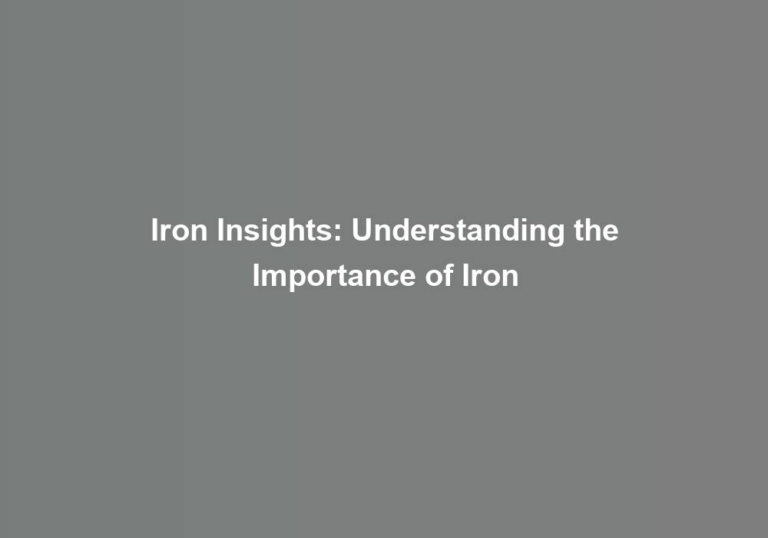Balancing Act: Understanding Key Minerals in Wellness
YouG??ve probably heard the old adage G??you are what you eat,G?? but have you ever considered the role minerals play in your overall wellness? Understanding the importance of key minerals such as calcium, magnesium, zinc, potassium, iron, and sodium is crucial for maintaining a balanced and healthy lifestyle. These minerals play a vital role in various bodily functions, from bone health to energy production. But how do you ensure youG??re getting the right balance of these essential minerals? ThereG??s more to it than meets the eye, and unlocking the secrets to optimal mineral intake could be the key to unlocking your best self.
The Role of Calcium in Wellness
Understanding the essential role of calcium in maintaining overall wellness is crucial for individuals seeking to optimize their health. Calcium is not only vital for maintaining strong bones and teeth but also plays a significant role in muscle function, nerve transmission, and hormone secretion. When it comes to bone health, calcium absorption is a key factor. Your body continually absorbs and deposits calcium into your bones, with the absorption process being regulated by various factors, including vitamin D levels, age, and dietary intake.
To ensure optimal calcium absorption, it is important to consume an adequate amount of calcium through your diet. Dairy products such as milk, cheese, and yogurt are well-known sources of calcium. However, for those who are lactose intolerant or follow a plant-based diet, there are plenty of alternative sources such as leafy green vegetables, fortified plant-based milk, tofu, and almonds. Additionally, consuming foods rich in vitamin D, such as fatty fish and egg yolks, can enhance calcium absorption.
Incorporating weight-bearing exercises into your routine also supports calcium absorption and bone health. Activities like walking, running, and weightlifting stimulate bone formation and help maintain bone density. Furthermore, avoiding excessive intake of caffeine and alcohol can contribute to better calcium absorption and overall bone health.
Understanding the significance of calcium absorption and its impact on bone health empowers you to make informed choices that support your overall wellness. By incorporating calcium-rich foods, vitamin D sources, and weight-bearing exercises into your lifestyle, you can take proactive steps to maintain strong and healthy bones.
Magnesium: The Mighty Mineral
You need to understand the importance of magnesium in maintaining your overall health. From energy production to muscle function, magnesium plays a crucial role in various bodily processes. ItG??s essential to know the best sources of magnesium to ensure youG??re meeting your daily requirements for this mighty mineral.
MagnesiumG??s Role in Health
Magnesium plays a crucial role in maintaining overall health and wellness, impacting various bodily functions and processes. Its benefits include supporting muscle and nerve function, regulating blood sugar levels, and contributing to bone health. Deficiency symptoms, such as muscle cramps, abnormal heart rhythms, and fatigue, underscore the importance of ensuring an adequate intake of this mighty mineral. To maintain optimal health, itG??s essential to incorporate magnesium-rich foods like almonds, spinach, and avocado into your diet. Additionally, consider discussing magnesium supplements with your healthcare provider if you struggle to meet the recommended daily intake. By prioritizing magnesium in your wellness routine, you can support your bodyG??s essential functions and promote overall health and vitality.
Sources of Magnesium
Pivotal to maintaining optimal health and wellness, magnesium can be obtained from a variety of natural food sources, ensuring an adequate intake of this essential mineral. Magnesium-rich foods include leafy green vegetables like spinach and kale, nuts and seeds such as almonds, cashews, and pumpkin seeds, as well as whole grains like brown rice and quinoa. Other sources include legumes, avocados, and low-fat dairy products. Incorporating these foods into your diet can help you meet your daily magnesium needs. However, in some cases, such as in individuals with certain medical conditions or those taking specific medications, magnesium supplementation may be necessary. ItG??s important to consult with a healthcare professional before starting any supplementation to determine the appropriate dosage and ensure it is safe for you.
Understanding ZincG??s Impact on Health
One essential mineral for maintaining optimal health is zinc, which plays a crucial role in various bodily functions. Ensuring that you have sufficient zinc in your diet is vital for your overall well-being. HereG??s why:
-
Immune Function: Zinc is essential for a healthy immune system. It supports the function of various immune cells, helps your body fight off infections, and promotes a speedy recovery when you do get sick.
-
Wound Healing: Zinc is involved in the process of wound healing. It helps with the production of new skin cells, reduces inflammation, and supports the bodyG??s ability to repair damaged tissues.
-
Sensory Functions: Zinc is necessary for proper sensory functions, including taste and smell. A deficiency in zinc can lead to decreased taste sensitivity and impaired sense of smell, affecting your overall enjoyment of food and potentially impacting your safety and well-being.
Recognizing the symptoms of zinc deficiency, such as impaired immune function, slow wound healing, and changes in sensory perception, is crucial for addressing any potential inadequacies in your zinc intake. By incorporating zinc-rich foods like meat, legumes, nuts, seeds, and dairy products into your diet, you can ensure that youG??re reaping the benefits of this essential mineral for your overall health and wellness.
Potassium: A Vital Mineral for Wellness
Potassium, like zinc, is another vital mineral essential for maintaining optimal health and wellness. It plays a crucial role in various bodily functions, making it essential to ensure you consume an adequate amount of dietary potassium.
| Potassium Benefits | Dietary Potassium |
|---|---|
| Regulates fluid balance in the body | Bananas |
| Supports proper muscle function | Sweet potatoes |
| Helps maintain healthy blood pressure | Spinach |
Potassium benefits include regulating fluid balance, supporting proper muscle function, and helping to maintain healthy blood pressure. It plays a significant role in nerve signaling, muscle control, and heart function. Since the body cannot produce potassium on its own, it must be obtained through dietary sources. Foods rich in dietary potassium include bananas, sweet potatoes, and spinach.
Ensuring an adequate intake of dietary potassium is essential for overall wellness. It can help prevent muscle cramps, regulate heartbeat, and maintain proper fluid balance in the body. Additionally, a diet rich in potassium may help lower blood pressure and reduce the risk of kidney stones and bone loss.
Incorporating potassium-rich foods into your diet, such as those listed in the table, can contribute to your overall well-being. By paying attention to your dietary potassium intake, you can support your body in functioning optimally and maintain a healthy lifestyle.
Iron: Essential for Energy and Vitality
You rely on iron to carry oxygen throughout your body, fueling your cells and providing you with the energy and vitality you need to thrive. Without enough iron, you may experience fatigue, weakness, and decreased immune function. ItG??s crucial to maintain adequate iron levels through a balanced diet and, if necessary, supplementation to support your overall well-being.
Iron for Energy
How does iron contribute to your bodyG??s energy production and overall vitality? Iron plays a crucial role in energy production by aiding in the transportation of oxygen throughout your body. HereG??s why iron is essential for maintaining your energy and vitality:
-
Iron Absorption: Consuming iron-rich foods alongside sources of vitamin C can enhance iron absorption, ensuring that your body receives an adequate amount of this vital mineral.
-
Preventing Iron Deficiency: Insufficient iron levels can lead to fatigue, weakness, and decreased immunity. Ensuring you meet your daily iron requirements can help prevent iron deficiency and its associated symptoms.
-
Sustaining Energy Levels: Iron contributes to the formation of hemoglobin, the protein in red blood cells that carries oxygen. Sufficient iron levels are crucial for sustaining energy levels and overall vitality.
Vitality and Iron
Iron is a vital mineral essential for maintaining energy levels and overall vitality due to its role in transporting oxygen throughout the body. Adequate iron absorption is crucial for preventing anemia, a condition characterized by fatigue and decreased vitality due to a lack of healthy red blood cells. To optimize iron absorption, pair iron-rich foods with sources of vitamin C, such as citrus fruits or bell peppers, which can enhance iron uptake in the body. Additionally, consuming iron alongside foods containing beta-carotene, like carrots and sweet potatoes, can support iron absorption. ItG??s also important to be mindful of factors that can inhibit iron absorption, such as excessive intake of coffee or tea with meals. By prioritizing iron absorption, you can help sustain your energy levels and overall vitality.
The Importance of Sodium in Balance
Balancing sodium intake is crucial for maintaining proper bodily function and overall health. Sodium balance is essential for hydration and wellness. HereG??s why it matters:
-
Fluid Balance: Sodium plays a critical role in maintaining the balance of fluids in your body. It helps regulate the amount of water that stays inside and outside your cells. This balance is vital for proper hydration, which affects everything from your energy levels to your ability to focus.
-
Nerve Function: Sodium is involved in transmitting nerve impulses and muscle contractions. Without the right balance of sodium, your nerves may not function optimally, leading to issues with muscle coordination and overall physical performance.
-
Blood Pressure Regulation: Sodium levels can impact blood pressure. Too much sodium can lead to higher blood pressure, increasing the risk of heart disease and stroke. Conversely, too little sodium can also negatively impact blood pressure and overall cardiovascular health.
Maintaining the right balance of sodium is crucial for your body to function optimally. ItG??s not just about avoiding excessive salt intake but also ensuring that you have enough sodium for essential bodily processes. By being mindful of your sodium intake, you can support your bodyG??s hydration, nerve function, and overall cardiovascular health.
Conclusion
You now have a deeper understanding of the key minerals that are essential for your overall wellness. Remember, these minerals play a vital role in maintaining your health and energy levels. So, make sure to include a variety of calcium-rich foods, load up on magnesium, and keep your zinc and potassium levels in check. ItG??s as important as breathing, but not quite as easy. Keep up the good work, and watch your wellness soar to new heights!







